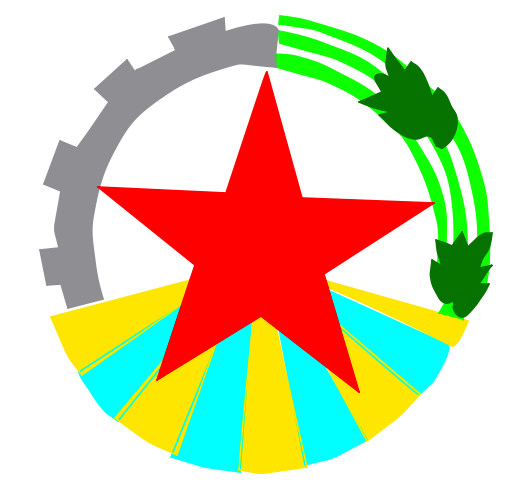Deviation Actions
Description
Communism (from Latin communis – common, universal)[1][2] is a socioeconomic system structured upon common ownership of the means of production and characterized by the absence of social classes, money,[3][4] and the state; as well as a social, political and economic ideology and movement that aims to establish this social order. The movement to develop communism, in its Marxist–Leninist interpretations, significantly influenced the history of the 20th century, which saw intense rivalry between the states which claimed to follow this ideology and their enemies.
Many historical groups have been considered as following forms of communism. Karl Marx and other early communist theorists believed that hunter-gatherer societies, as were found in the Palaeolithic, were essentially egalitarian and he therefore termed their ideology to be "primitive communism". Early Christianity supported a form of common ownership based on the teachings in the New Testament which emphasised sharing amongst everyone equally. Other ancient Jewish sects, like the Essenes, also supported egalitarianism and communal living.[1]
In Europe during the Early Modern period, various groups supporting communist ideas appeared. Tommaso Campanella in his The City of the Sun propagated the concept of a society where the products of society should be shared equally (1601).[2] Within a few centuries, during the English Civil War, various groups on the side of the Roundheads propagated the redistribution of wealth on an egalitarian basis, namely the Levellers and the Diggers.[3] In the eighteenth century the French philosopher Jean Jacques Rousseau in his hugely influential The Social Contract (1762), outlined the basis for a political order based on popular sovereignty rather than the rule of monarchs.[4] His views proved influential during the French Revolution of 1789, in which various anti-monarchists, particularly the Jacobins, supported the idea of redistributing wealth equally among the people, including Jean-Paul Marat and Gracchus Babeuf. The latter was involved in the Conspiracy of the Equals of 1796 intending to establish a revolutionary regime based on communal ownership, egalitarianism and the redistribution of property.[5] The plot was however detected and he and several others involved were arrested and executed. Despite this setback the example of the French Revolutionary regime and Babeuf's doomed insurrection was an inspiration for radical French thinkers such as Compte Henri de Saint Simon, Louis Blanc, Charles Fourier and Pierre-Joseph Proudhon who declared that Property is theft!”.[6]
The term "communist society" should be distinguished from "communist state", the latter referring to a state ruled by a party which professes a Marxist-Leninist variation of communist ideology.
In Marxist theory, communism is a specific stage of historical development that inevitably emerges from the development of the productive forces that leads to a superabundance of material wealth, allowing for distribution based on need and social relations based on freely-associated individuals.[1][2]
In a communist society, economic relations no longer would determine the society. Scarcity would be eliminated in all possible aspects.[3] Alienated labor would cease, as people would be free to pursue their individual goals.[4] This kind of society is identified by the slogan put forth by Karl Marx: "From each according to his ability, to each according to his need."[3]
Marx never clearly said whether communist society would be just; others have speculated that he thought communism would transcend justice and create society without conflicts, thus, without the needs for rules of justice.[5] It would be a democratic society, enfranchising the entire population.[3]
Marx also wrote that between capitalist and communist society, there would be a transitory period known as the dictatorship of the proletariat.[3] During this preceding phase of societal development, capitalist economic relationships would be abolished and in place would arise socialism. Natural resources and earth would become public property, while all manufacturing centres and workplaces would become owned by their workers and democratically managed. Production would be organised by scientific assessment and planning, thus eliminating what Marx called the "anarchy in production". The development of the productive forces would lead to the marginalisation of human labour to the highest possible extent, replacing with automated labour.
A communist society would also have no need for a state, whose purpose was to enforce hierarchical economic relations (thus Marx wrote of "the withering of the state").

































![Flag of the Hooviet Union [Codexverse]](https://images-wixmp-ed30a86b8c4ca887773594c2.wixmp.com/f/f331e12e-54a8-4254-94e3-99e4f328f6ac/deswlnd-1ce6b101-66e3-4c76-980a-b069e2349dd2.png/v1/crop/w_184)
![Hungarian People's Republic [Pre-1956]](https://images-wixmp-ed30a86b8c4ca887773594c2.wixmp.com/f/ff0b1107-feed-4b92-a9c2-e7c4aff0ea1d/deokuw3-639d8a0a-fe4d-47e2-b522-0528a6e9a1e0.png/v1/crop/w_184)

